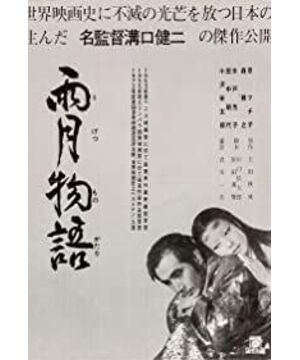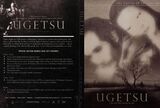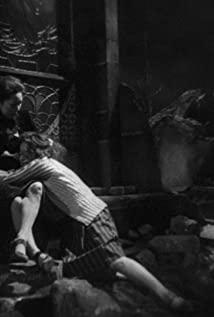But it also has a different kind of beauty. When the smoke was filled, or the shadow of the candle was shaking, there was a hazy and mysterious luster covering the world, as if everything was about to melt into the boundless darkness at once. The scene of sailing on the water is fascinating. With only one shot change, the boat suddenly swims into the painting; the sewing under the lamp is more like a dream scene, and the figures float like a phantom, with only a light like a bean. The warmth came to the world slowly.
There is also the soundtrack, which uses traditional orchestral and percussion instruments, and is accompanied by a gossamer singing voice, which is like weeping and touching. When Abin was shamelessly raped by bandits, the drums sounded all around, slow and heavy, which coincided with her powerless anger; when the palace fell into ruins, Mrs. Wakasa’s singing was sad and misty, which was different from the previous music. It seems to be telling the grievances that the wish is difficult; at the end of the film, Miyagi puts away her husband’s shoes and prepares to sew the clothes. Suddenly, there is a shrill string music, with a dumbness in sorrow, like a lightning flashing down from the sky, about to be in front of him. Harmony's family scene is torn apart. These tragic music is an elegy dedicated to women. They sacrificed their meager lives in the troubled times, but their souls are still unwilling to return with the elegy.
This ghost story of flowers and fog is almost strange, bizarre and twists and turns. In fact, he is crying about the ravages of human nature caused by war, and the tragic fate of women also comes from this. When men are dedicated to chasing wealth and fame, it is the hard-working and courageous wives who are trying to maintain the family atmosphere; the men faint and go around a long circle, the wealth comes and disappears like clouds, but suddenly finds that the wives are still in their original form. Waiting for their return: they have already grasped the true meaning of life. This is the female point of view of director Mizoguchi Kenji, who believes that they have simple wisdom and keen intuition, and yearn for the joy and harmony of the family wholeheartedly, which is different from the short-sighted beard. They are soft and tough, and they are more of a shelter for the family than their husbands. They have guided the life inheritance of sunrise and sunset for generations. But even such a simple request can only be exchanged for life and death, and the glory of success is all saturated with their tragic tears.
Mrs. Wakasa's personality is more complicated, somewhat similar to the early Chinese "White Lady Yongzhen Leifeng Pagoda". Feng Menglong's portrayal of the White Lady in Jing Shi Tong Yan retains her early character traits. In the story, she does not appear as a gentle female ghost but a wild and lustful monster. Being removed by Fahai is also a delightful thing. At this point, Mrs. Wakasa's experience is very similar to that of the White Lady. She seduce a lecherous young man and was subdued by the monk's magic power. Obviously, she is not an "ideal woman" under orthodox norms. She does not have a virtuous and virtuous style, but has a certain inner self-awakening. She had been turned into bones in the disaster of extermination, but because she had not experienced love and joy before her death, she resolutely returned to the world. Her pursuit also carries the meaning of revenge: the war destroyed her family, so she wanted to dismantle other people's families; the war destroyed her life, so she also wanted to destroy other people's lives to accompany her.
Mrs. Wakasa's beautiful eyes are flowing, her lips are dripping, and she seems delicate, but in fact she is the one who takes the initiative. However, judging from her coquettish style, it is only eroticism, not love, that can be fulfilled. But in this bleak and troubled world, men can even abandon their wives and children for profit, so where does the affection come from? She is just a gorgeous episode, and betrayal is inevitable. Wakasa's tragic life experience and Ligui identity make people fear and pity, and her desperate pursuit is equally tragic and helpless. The director also sympathetically gave many beautiful images to her and her palace. Playing under the cherry blossom trees even has the rare brightness of the whole film. It extends from the previous scene over the long, brightly-increasing shots, stacking continuously. No wonder some people say that this movie has the visual effects of traditional scroll paintings.
Watching this movie, it is easy to think of the "a thousand red one cry, ten thousand beauty and sorrow" in "Dream of Red Mansions", how many weak and beautiful women have become the victims of life. War is like a nightmare, staring at this barren land with fierce eyes open. The tragedy is not over yet. According to historical records, in 1582-6 years after the outbreak of the civil war in the film-the battle between the lords broke out again, and the battle of Sekihara, which lasted until 1600, was the fiercest in the history of the Warring States Period. War. The Omi where Juro and Fujihira are located has always been near the battlefield. The peaceful and peaceful life situation at the end of the film is probably the director's ideal like a castle in the sky.
View more about Ugetsu reviews










